Related Research Articles

The Dasht-i-Leili massacre occurred in December 2001 during the U.S. invasion of Afghanistan when 250 to 2,000 Taliban prisoners were shot and/or suffocated to death in metal shipping containers while being transferred by Junbish-i Milli soldiers under the supervision of forces loyal to General Rashid Dostum from Kunduz to Sheberghan prison in Afghanistan. The site of the graves is believed to be in the Dasht-e Leili desert just west of Sheberghan, in the Jowzjan Province.
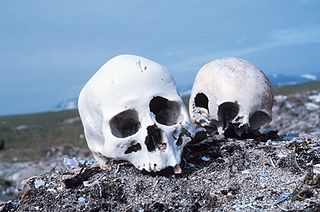
Forensic anthropology is the application of the anatomical science of anthropology and its various subfields, including forensic archaeology and forensic taphonomy, in a legal setting. A forensic anthropologist can assist in the identification of deceased individuals whose remains are decomposed, burned, mutilated or otherwise unrecognizable, as might happen in a plane crash. Forensic anthropologists are also instrumental in the investigation and documentation of genocide and mass graves. Along with forensic pathologists, forensic dentists, and homicide investigators, forensic anthropologists commonly testify in court as expert witnesses. Using physical markers present on a skeleton, a forensic anthropologist can potentially determine a person's age, sex, stature, and race. In addition to identifying physical characteristics of the individual, forensic anthropologists can use skeletal abnormalities to potentially determine cause of death, past trauma such as broken bones or medical procedures, as well as diseases such as bone cancer.

Dr. Kathleen Joan Toelle Reichs is an American crime writer, forensic anthropologist and academic. She is an adjunct professor of anthropology at the University of North Carolina at Charlotte; as of 2016 she is on indefinite leave. She is also affiliated with the Laboratoire des Sciences Judiciaires et de Médecine Légale for the province of Quebec. She is one of 100 anthropologists certified by the American Board of Forensic Anthropology and is on the board of directors of the American Academy of Forensic Sciences. Her schedule also involves a number of speaking engagements around the world. Reichs was a producer for the TV series Bones, which is loosely based on her novels, which in turn, are inspired by her life. She has two daughters, Kerry and Courtney, and one son, Brendan.

The Plan de Sánchez massacre took place in the Guatemalan village of Plan de Sánchez, Baja Verapaz department, on 18 July 1982. Over 250 people were abused and murdered by members of the armed forces and their paramilitary allies.
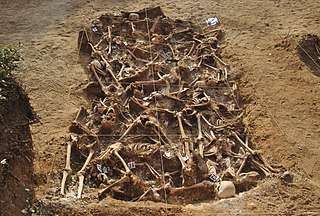
A mass grave is a grave containing multiple human corpses, which may or may not be identified prior to burial. The United Nations has defined a criminal mass grave as a burial site containing three or more victims of execution, although an exact definition is not unanimously agreed upon. Mass graves are usually created after many people die or are killed, and there is a desire to bury the corpses quickly for sanitation concerns. Although mass graves can be used during major conflicts such as war and crime, in modern times they may be used after a famine, epidemic, or natural disaster. In disasters, mass graves are used for infection and disease control. In such cases, there is often a breakdown of the social infrastructure that would enable proper identification and disposal of individual bodies.
Physicians for Human Rights (PHR) is a US-based not-for-profit human rights NGO that uses medicine and science to document and advocate against mass atrocities and severe human rights violations around the world. PHR headquarters are in New York City, with offices in Boston and Washington, D.C. It was established in 1986 to use the unique skills and credibility of health professionals to advocate for persecuted health workers, prevent torture, document mass atrocities, and hold those who violate human rights accountable.
The Guatemalan Forensic Anthropology Foundation is an autonomous, non-profit, technical and scientific non-governmental organisation. Its aim is to strengthen the administration of justice and respect for human rights by investigating, documenting, and raising awareness about past instances of human rights violations, particularly unresolved murders, that occurred during Guatemala's 30-year-long Civil War.
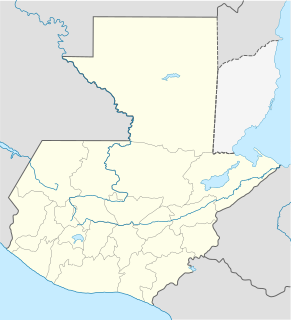
San José Poaquil is a town and municipality in the Chimaltenango department of Guatemala. San José Poaquil, like many other Mayan indigenous towns throughout the western highlands, suffered greatly under the severe military repression of the early 1980s. In 2002, 76 human remains were exhumed from mass graves by the Forensic Anthropology Foundation of Guatemala (FAFG). According to locals, the 76 bodies that FAFG recovered represent a minimal portion of the municipality's residents that were killed or disappeared in the violence. Like other parts in Guatemala, reconciliation in Poaquil is complicated by the fact that the perpetrators of the violence, many of whom were forcibly conscripted into the military's Civil Defense Patrols (PAC), still live amongst their victims.
Clyde Snow was a well-known U.S. forensic anthropologist. Some of his skeletal confirmations include John F. Kennedy, victims of John Wayne Gacy, King Tutankhamun, victims of the Oklahoma City bombing, and Nazi doctor Josef Mengele.

Afghan Massacre: The Convoy of Death is a 2002 documentary by Irish filmmaker Jamie Doran and Afghan journalist Najibullah Quraishi. It documents alleged war crimes committed by the Junbish-i Milli faction of the Afghan Northern Alliance under General Abdul Rashid Dostum against Taliban fighters. The Taliban fighters, who had surrendered to Dostum's troops after the November 2001 siege of Kunduz, were transported to Sheberghan prison in sealed containers. Human rights groups estimate that hundreds or thousands of them died during and after transit. Afghan Massacre: The Convoy of Death presents testimony from interviewees stating that American military personnel were present at and complicit in some of the mass killings, known as the Dasht-i-Leili massacre.

In Chechnya, mass graves containing hundreds of corpses have been uncovered since the beginning of the Chechen wars in 1994. As of June 2008, there were 57 registered locations of mass graves in Chechnya. According to Amnesty International, thousands may be buried in unmarked graves including up to 5,000 civilians who disappeared since the beginning of the Second Chechen War in 1999. In 2008, the largest mass grave found to date was uncovered in Grozny, containing some 800 bodies from the First Chechen War in 1995. Russia's general policy to the Chechen mass graves is to not exhume them.
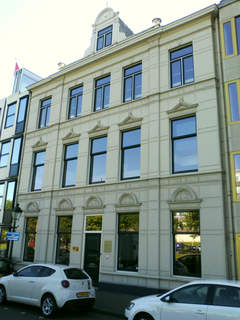
The International Commission on Missing Persons (ICMP) is an intergovernmental organization that addresses the issue of persons missing as a result of armed conflicts, violations of human rights, and natural disasters. It is headquartered in The Hague, The Netherlands. It assists governments in the exhumation of mass graves and DNA identification of missing persons, provides support to family associations of missing persons, and assists in creating strategies and institutions to search for missing persons. In December 2014, a treaty was signed which established the commission as an International Organisation. The treaty has five signatories: the Netherlands, the United Kingdom, Sweden, Belgium and Luxembourg. It designates The Hague (Netherlands) as the seat of the organization.
The Argentine Forensic Anthropology Team is an Argentine not-for-profit scientific non-governmental organisation. It was created in 1986 at the initiative of various human rights organisations with the aim of developing forensic anthropology techniques to help locate and identify the Argentines who had disappeared during the "Dirty War" period of the 1976–1983 military dictatorship. Since then, the Team's members have conducted field work in 30 other countries, including Bosnia and Herzegovina, Angola, Timor-Leste, French Polynesia, Croatia and South Africa. In particular, the EAAF acquired additional worldwide renown by identifying the remains of Ernesto "Che" Guevara, found in Bolivia.
ADIVIMA is a non-profit human rights organization in Guatemala that works to find solutions to the social, economic, political, cultural, and educational problems that resulted from the Guatemalan Civil War. The organization is based in Rabinal, Baja Verapaz, and concentrates its work in the surrounding communities that were some of those most affected by the violence of the internal conflict.
Arthur Keith Mant was a British forensic pathologist who headed the Special Medical Section of the British Army's War Crimes Group which investigated Nazi war crimes committed during World War II.
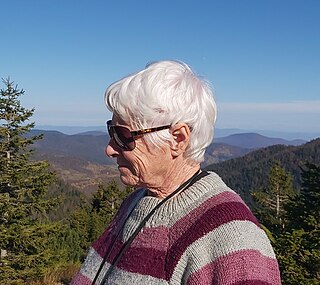
EwaElvira Klonowski is a forensic anthropologist. She took political refuge in Iceland in 1981, following the declaration of martial law in the People's Republic of Poland. She has been living in Reykjavik, Iceland since 1982. In 1996, she began working on individual and mass graves exhumation in Bosnia and Herzegovina. Since then, she has been responsible for the excavation and identification of over 2,000 victims, and in 2005 she was nominated to the list of the 1,000 Women for the Nobel Peace Prize.
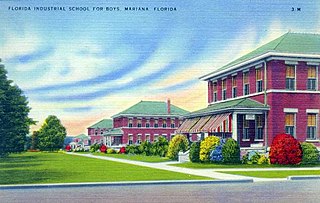
The Florida School for Boys, also known as the Arthur G. Dozier School for Boys (AGDS), was a reform school operated by the state of Florida in the panhandle town of Marianna from January 1, 1900, to June 30, 2011. A second campus was opened in the town of Okeechobee in 1955. For a time, it was the largest juvenile reform institution in the United States.
Eric Stover is an American human rights researcher and advocate and faculty director of the Human Rights Center at the University of California at Berkeley.

Erin H. Kimmerle is an American forensic anthropologist, artist, and Executive Director of the Institute of Forensic Anthropology & Applied Science at the University of South Florida. She was awarded the 2020 AAAS Award for Scientific Freedom and Responsibility.
Phoebe Stubblefield is an American forensic anthropologist specializing in human skeletal variation, human identification, and paleopathology. She is currently the Interim Director of the C.A. Pound Human Identification Laboratory at the University of Florida. She was formerly an Associate Professor at the University of North Dakota, where she also served as Chair of the Anthropology Department and Director of the Forensic Science Program. Her research integrates cultural anthropology and forensic science. She is currently leading efforts to locate and identify the remains of hundreds of victims of the 1921 Tulsa race massacre.
References
- ↑ Black, Richard (15 February 2004). "Guatemala rights scientist honoured". BBC News. Retrieved 17 June 2008.
- ↑ Human rights alert from Amnesty International issued 30 May 2007.
- ↑ "Fredy Peccerelli, Executive Director of the Guatemalan Forensic Anthropology Foundation Speaks at AAAS" . Retrieved 16 June 2008.
- ↑ Transcript for case number IT-05-88-T, The Prosecutor versus Vujadin Popovic et al., see especially parts marked pages 8749-8753